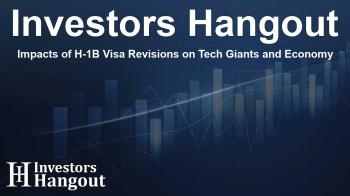Impacts of H-1B Visa Revisions on Tech Giants and Economy

Polling Insights on H-1B Visa Elimination
Recently, a notable poll conducted by Ron DeSantis revealed significant public backing for the elimination of H-1B visas. Out of over 49,000 participants, a striking 62.3% supported this change, viewing the program as no longer necessary. A substantial portion of respondents, 31.4%, acknowledged the need for reforms to the existing visa structure, while only 6.3% believed the program should remain unchanged. This overwhelming support underscores a growing sentiment towards re-evaluating foreign worker programs.
Proposed Changes in Visa Application Fees
Trump's $100,000 Visa Fee Initiative
As part of the new immigration policy set to take effect from 2026, the former President seeks to impose a one-time application fee of $100,000 for all new H-1B visa applicants. This fee structure has sparked considerable discussion regarding its potential implications, especially since this fee will not be required for renewal applications or current visa holders. Many believe that this could significantly deter foreign professionals seeking to work in the United States, thereby impacting the labor market.
The H-1B Program's Significance
Introduced with the Immigration Act of 1990, the H-1B program has become critical for U.S. employers, particularly within the technology sector. It facilitates the hiring of highly skilled professionals in science, technology, engineering, and mathematics (STEM) fields, making it a crucial element for innovation and growth among tech companies. As the economy evolves, many argue that maintaining an accessible path for talented global workers is essential for sustaining the competitive edge of U.S.-based firms.
Reactions from Industry Leaders
Support and Concerns from Business Executives
Key figures in the tech industry, including Nvidia Corporation (NASDAQ: NVDA) CEO Jensen Huang, have publicly supported Trump’s initiative. Huang described the proposed fee as a "great start," voicing concerns about a brain drain and emphasizing the intrinsic link between the U.S. brand and the notion of the "American dream." Conversely, Netflix Inc. (NASDAQ: NFLX) co-founder Reed Hastings also expressed support, branding the new fee as a "great solution" to current challenges in talent acquisition.
Broader Economic Perspectives
On the flip side, industry leaders like Jamie Dimon, CEO of JPMorgan Chase (NYSE: JPM), have called on the White House to promote positive immigration policies that favor skilled workers. Several economists warn that the changes could stifle innovation over time. Kevin O'Leary expressed concerns that such policies might push essential innovation processes abroad, possibly impacting the growth trajectories of major corporations like Amazon.com Inc. (NASDAQ: AMZN), Google (NASDAQ: GOOGL), and Meta Platforms Inc. (NASDAQ: META).
The Political Environment and Future Implications
The ongoing debate highlights a crucial intersection between technology, immigration policy, and economic growth. The diverse opinions reflect the intricate balance that both Silicon Valley and government authorities must navigate to ensure a thriving economic future. With major companies relying heavily on H-1B visas, any significant policy changes could reverberate throughout the industry, prompting firms to reconsider their hiring strategies in an increasingly competitive global environment.
Frequently Asked Questions
What are H-1B visas and why are they important?
H-1B visas allow U.S. employers to hire foreign professionals in specialized fields, facilitating a vital workforce for many tech companies.
What changes are being proposed for H-1B visa applications?
The proposed changes include a one-time application fee of $100,000 for new applicants, which has stirred debate on its implications for employment.
Why is the public sentiment shifting against H-1B visas?
Recent polling indicates a growing concern over the program's effectiveness and its impact on domestic job opportunities, leading many to support its elimination.
How do industry leaders view the proposed visa changes?
Responses are mixed; while some executives support the changes as necessary, others warn they may hinder innovation and economic growth.
What could be the broader implications of the visa policy changes?
Changes could affect the ability of U.S. companies to attract top talent, potentially impacting their competitiveness in the global market.
About The Author
Contact Riley Hayes privately here. Or send an email with ATTN: Riley Hayes as the subject to contact@investorshangout.com.
About Investors Hangout
Investors Hangout is a leading online stock forum for financial discussion and learning, offering a wide range of free tools and resources. It draws in traders of all levels, who exchange market knowledge, investigate trading tactics, and keep an eye on industry developments in real time. Featuring financial articles, stock message boards, quotes, charts, company profiles, and live news updates. Through cooperative learning and a wealth of informational resources, it helps users from novices creating their first portfolios to experts honing their techniques. Join Investors Hangout today: https://investorshangout.com/
The content of this article is based on factual, publicly available information and does not represent legal, financial, or investment advice. Investors Hangout does not offer financial advice, and the author is not a licensed financial advisor. Consult a qualified advisor before making any financial or investment decisions based on this article. This article should not be considered advice to purchase, sell, or hold any securities or other investments. If any of the material provided here is inaccurate, please contact us for corrections.

